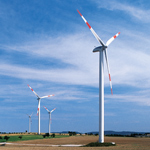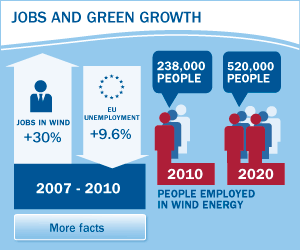
The WWF logo
Recently some national governments in Europe have made changes to their support mechanisms for renewable energies that have created an environment of insecurity for the wind energy sector. However, a new report by the WWF says that such policies create needed certainty for renewable energy investors, backing up a view held by EWEA.
Uncertainty about future policy support for renewable energy in key markets such as the UK, Italy and France has contributed to a notable drop in investment levels across the EU. However, On Picking Winners, a report written by Dr Rob Gross of Imperial College London, argues that given the numerous benefits of renewable energy, it is vital that the EU and its member state governments provide the support needed to ensure it plays its full part in decarbonising the EU’s energy system.
“Without targeted and proportionate policies supporting our renewables industry, we will miss out on the opportunity rapidly to reduce the costs of emerging renewable technologies, and will fail to capitalise on the promising economic growth opportunities that the sector has to offer in the EU,” says Imke Lübbeke, Senior Renewable Energy Policy Officer at WWF European Policy Office.
continue reading »
 A new UK-wide poll indicating that more than two-thirds of respondents would favour a community-owned wind turbine close to their home rather than a shale gas well is bound to raise questions about Chancellor George Osborne’s proposed “dash for gas.”
A new UK-wide poll indicating that more than two-thirds of respondents would favour a community-owned wind turbine close to their home rather than a shale gas well is bound to raise questions about Chancellor George Osborne’s proposed “dash for gas.”
The Guardian reported Tuesday that the poll, conducted by ICM Survey, shows only coal and nuclear are less popular that shale gas.
When asked to choose between having the two energy sources within two miles of their home, the Guardian noted, 67% of respondents favoured a turbine, compared to just 11% who would support the gas development.
continue reading »
 Aviation constraints are a huge issue for the wind industry. In 2011, EWEA carried out a survey and found that 19 GW of wind projects were blocked by radar difficulties in the UK, Finland, Sweden, Germany, Czech Republic, France, Spain, Greece and Ireland.
Aviation constraints are a huge issue for the wind industry. In 2011, EWEA carried out a survey and found that 19 GW of wind projects were blocked by radar difficulties in the UK, Finland, Sweden, Germany, Czech Republic, France, Spain, Greece and Ireland.
Many difficulties for wind farm developers come from conflicts with obsolete radar equipment and problems associated with keeping track of system upgrades over time. According to Renewable UK, for example, half of all wind farm developments in the UK will face objections from aviation stakeholders on the grounds of radar interference, obstruction or impact to low flying. However, a new promising radar technology could be one way to solve some of these problems.
Cambridge Airport in the south-east of England has signed a deal to use so-called 3D holographic radar technology. Its creators claim that the technology is the first of its kind that can reliably discriminate between wind turbines and aircraft based on differences in their behaviour.
continue reading »
 Extending or ending the US’s Production Tax Credit is a topic high in the minds of wind industry professionals with interests in the US, but how is it reported in US media?
Extending or ending the US’s Production Tax Credit is a topic high in the minds of wind industry professionals with interests in the US, but how is it reported in US media?
Interestingly, an increasing number of US newspapers support an extended PTC. Here, we round-up some of the latest articles…
In San Angelo,Texas the Standard-Times said, “give the wind industry some certainty, and then stand back and watch the turbines spin.” In an editorial on Saturday the newspaper noted the tax credit of 2.2 cents per kilowatt-hour is set to expire at the end of the year unless Congress renews it. “Few disagree that failing to extend it will cause great harm to the industry just as it is beginning to flourish,” the newspaper lobbied. continue reading »
 The nuclear industry’s ‘Foratom’ blog recently criticised EWEA’s argument in a recent report that “massive subsidies to fossil fuels and nuclear energy…. remain the rule”.
The nuclear industry’s ‘Foratom’ blog recently criticised EWEA’s argument in a recent report that “massive subsidies to fossil fuels and nuclear energy…. remain the rule”.
Foratom instead claimed that “it is renewable energies, especially wind and solar energy that are the most systematically subsidised forms of energy, not nuclear energy.”
Foratom then set out some of the subsidies renewables receive. The highest figure they quote is “In Germany, total subsidies amount to €5 billion per year”.
But Foratom does not mention the massive amounts of public money set aside for nuclear decommissioning. €5 billion is a trivial sum compared to the money the UK Government has set aside just for nuclear decommissioning.
Former UK Energy Secretary Chris Huhne said in October 2011 “the provisions for nuclear decommissioning costs in total were £2 million in 1970, £472 million in 1980, £9.5 billion in 1990, £22.5 billion in 2000. And now, £53.7 billion.” continue reading »











